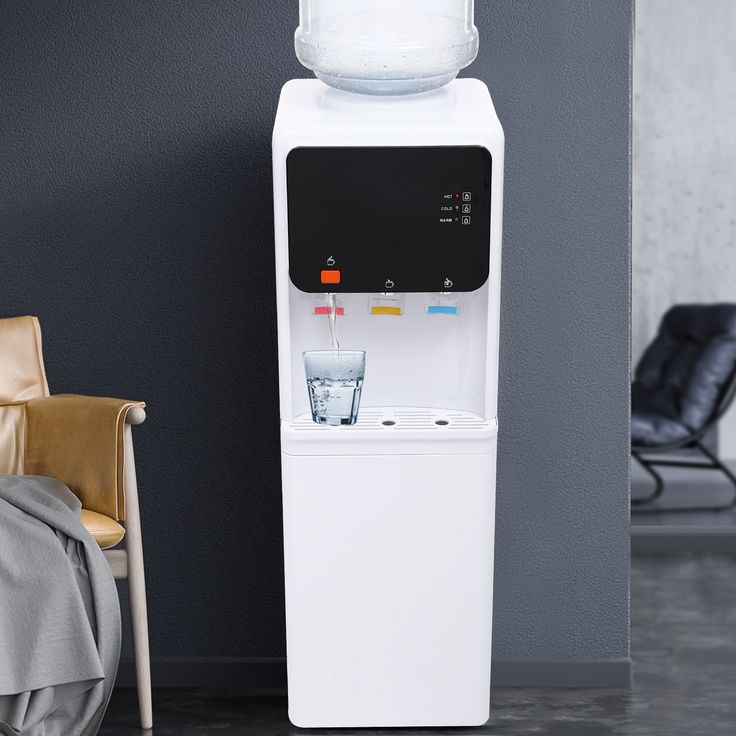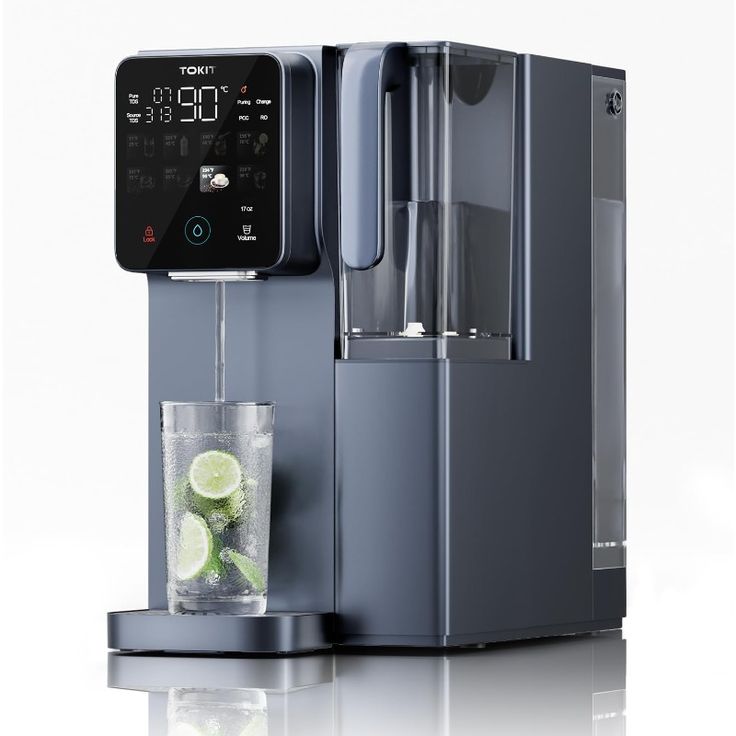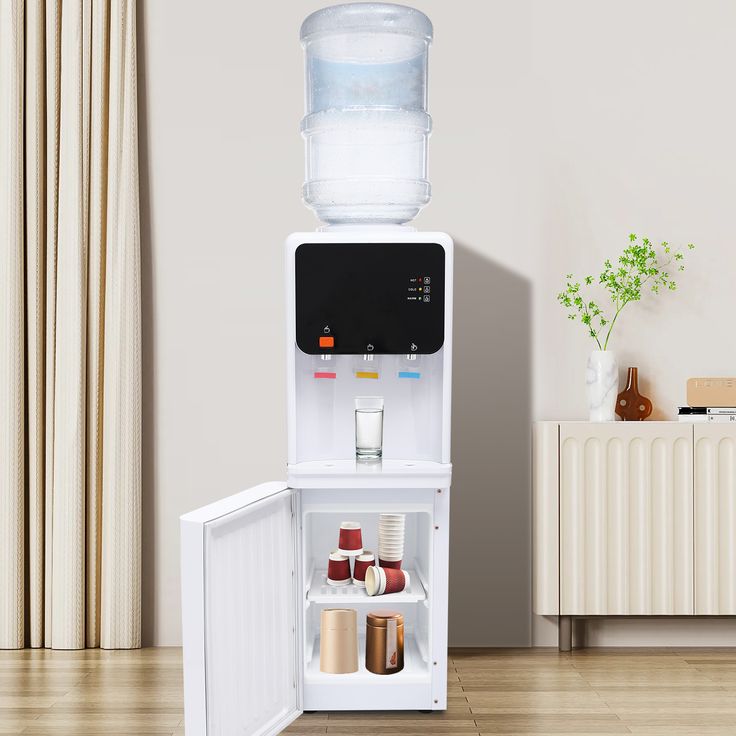Potential Contamination from Water Coolers
Water coolers offer convenience in offices and homes. However, they could harbor harmful pathogens. Regularly, people raise concerns about illness from water dispenser use. So, it’s vital to understand the water dispenser health risks.

Bacteria and Mold in Water Dispensers
Bacteria like E.coli and molds can thrive in unclean dispensers. Water sitting stagnant in coolers becomes a breeding ground for microorganisms. Illnesses, like diarrhea and fever, may result from using contaminated dispensers. Hence, it’s crucial to maintain cleanliness.
Precautionary Measures for Safe Usage
Taking precautionary steps can safeguard health. First, always follow the manufacturer’s cleaning guidelines. Use sanitizers that tackle a broad range of microbes. Moreover, inspect for mold and smells. They indicate the need for cleaning. Also, if left unused, drain the water cooler to prevent microbe growth.
Ensure electrical safety around the dispenser. Keep it away from outlets to prevent accidents. Moreover, be cautious with hot water to avoid burns. Implement a regular cleaning schedule and use protective gear when necessary. Clean drip trays and water taps consistently to prevent bacteria build-up. Doing these things can help mitigate water dispenser health risks.
Risks of Using Hot Water from Taps
Using hot water from taps for drinking or cooking might pose health risks. Hot water systems can harbor sediments, rust, and contaminants. These compounds can negatively impact water quality over time. Bacteria, such as Legionella, often grow in hot water tanks due to the warmth. This presents a real health hazard when water isn’t used regularly.
Contaminants in Hot Water Systems
Pipes leading to your tap may leach metals, like lead. These can seep into your hot water and may cause health issues with long-term consumption. Chemicals used to treat hot water can also be harmful for drinking. This introduces a risk of consuming unwanted substances through your hot water tap.
Alternatives to Hot Water Taps
Hot water dispensers are safer than hot taps for getting clean, hot water. They provide water on demand, so it doesn’t sit long enough to allow bacteria to grow. These dispensers have filters that remove impurities, making sure the water is pure. They are also designed to heat water instantly, minimizing the presence of harmful contaminants. Switching to a hot water dispenser can ensure the safety of your water. It can also improve the taste and smell, making drinks and food more enjoyable.

Regular Maintenance and Cleaning
Keeping a water dispenser clean is crucial for health and safety reasons. Proper maintenance not only ensures that the water is safe for consumption but also extends the lifespan of the dispenser.
Cleaning Schedule for Water Dispensers
- Establish a Routine: To effectively manage cleanliness, it’s essential to set a regular cleaning schedule. Aim for weekly cleanings using a suitable disinfectant to eradicate germs.
- Focus on Key Areas: During each cleaning session, pay special attention to the taps, drip trays, and all external surfaces. These areas are prime spots for bacteria and contamination.
- Prevent Microbial Growth: Consistent cleaning prevents the growth of harmful microbes, guaranteeing safe drinking water for everyone.
- Assign Responsibilities: To ensure consistency, designate specific individuals for cleaning duties or use digital reminders. This helps maintain organization and accountability within a workplace or home setting.
Importance of Disinfecting Water Dispensers
- Choose Effective Sanitizers: Using a broad-spectrum sanitizer is essential for disinfecting a water dispenser. This practice effectively eliminates various types of bacteria, molds, and pathogens that can lead to illnesses.
- Follow Manufacturer Guidelines: Always refer to the dispenser’s user manual for appropriate cleaning agents and procedures. This ensures you are using safe and effective products.
- Health Benefits: Regular disinfection not only keeps the water clean and drinkable but also protects the overall health of all users. Maintaining a clean water dispenser is a simple yet vital step to promote wellness in any environment.
Proper Usage to Prevent Bacterial Spread
Proper use of water dispensers is key in avoiding bacterial spread. Simple habits can make a big difference in maintaining health and safety.
Tips for Using Cups and Bottles
When using a water dispenser, it’s important to keep hygiene in mind. Here are some concise tips:
- Always use clean cups or bottles. This prevents germ transfer.
- Refrain from sharing drinkware. It lowers the risk of cross-contamination.
- Bring personal reusable containers. This is eco-friendly and safe.
- If using disposable cups, store them properly. Keep them dry and away from the dispenser area.
Following these tips can significantly reduce the chances of bacteria entering your body through drinking water.
Importance of Not Touching the Dispenser Nozzle
The nozzle is often overlooked but it’s a hotspot for germs. Take note:
- Handle the dispenser lever with a paper towel if possible. This minimizes direct contact with the nozzle.
- Teach others to avoid touching the nozzle. Spread awareness for community health.
- Look for dispensers with no-touch features. These come with sensors for more hygienic use.
By prioritizing these simple actions, we help maintain the purity of our drinking water. Ensuring the nozzle remains untouched by hands protects us all against bacteria and viruses.

Water Dispenser Design and Features for Safety
Water dispensers are designed with features that boost safety and health.
Automatic Sterilization Functions
Modern water dispensers include automatic sterilization features for enhanced safety. They use UV light or heat to kill germs and prevent bacterial growth. This feature ensures that every drop of water is safe for consumption, without manual intervention.
Filtration Systems in Dispensers
Water dispensers often have built-in filtration systems. These systems remove contaminants like chlorine, lead, and microbes. Ensuring the water is not just clean, but also tastes and smells better. Regular filter replacement is essential to maintain the effectiveness of the system.
Best Practices for Ensuring Water Quality
Maintaining top-notch water quality from dispensers is crucial.
Keeping the Dispenser Area Clean
A clean dispenser area helps prevent contamination. Here are some steps to achieve it:
- Wipe the dispenser daily with a disinfectant. This removes spills and stains.
- Dry the drip tray often to stop mold growth. Humidity breeds bacteria.
- Keep cups and bottles tidy, arranged, and covered. This reduces dust and debris.
- Encourage users to clean the area after use. A collective effort keeps it sanitary.
These actions hinder bacteria and mold from affecting water quality.
Replacing Water Filters Regularly
Changing filters is vital for pure water. It stops contaminants from seeping in. Remember:
- Follow the manufacturer’s schedule for filter changes. Timely replacements are key.
- Check for signs of filter wear, like odd tastes or reduced flow. Don’t ignore them.
- Use the right filters for your dispenser. Compatibility ensures effectiveness.
- Document each replacement date. Tracking helps maintain a routine.
Regular filter updates keep water safe and tasting fresh.
Conclusion and Recommendations
In wrapping up, water dispensers pose health risks if not used or maintained properly. To avoid illnesses, regular cleaning is crucial. Follow the manufacturer’s guidelines to disinfect and remove germs. Do not touch the nozzle directly; use clean cups and do not share them. Replace water filters as advised
to keep the quality of water high.
Summary of Health Risks and Prevention Tips
Bacteria and mold can grow in water dispensers and make you sick. Clean often, using the right sanitizers and proper methods. Watch for mold and stale smells; they signal a need for cleaning.
Always handle the dispenser carefully, especially if it dispenses hot water, to prevent burns.
Advantages of Water Dispensers with Health Safeguards
Modern water dispensers come with features that protect your health. They have filtration systems to clean the water and automatic sterilization to kill bacteria. These features ensure you get safer and tastier drinking water.
Choose dispensers with these advantages for the wellbeing of all who use them.
